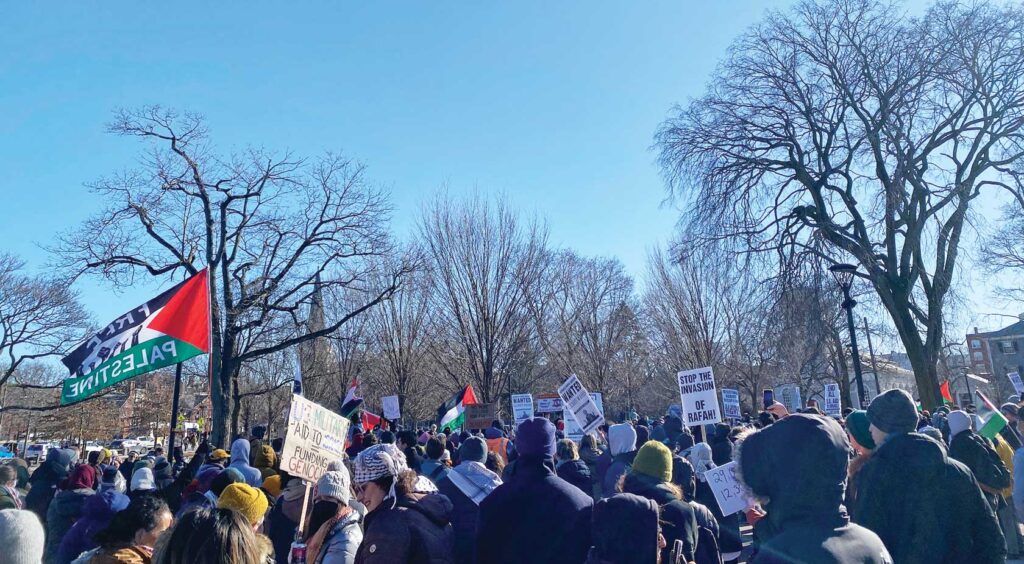
Shea Thompson sees parallels between what is happening in Gaza and what is happening in his own backyard.
“I look at how a lot of civil rights leaders from the past such as Malcolm X and Martin Luther King Jr. tied their struggle for civil rights in America to other fights for liberation,” he said.
The Oct. 7 Hamas attack on Israel set off an ongoing, months-long war in Gaza. AP News has reported more than 29,000 Palestinians and more than 1,400 Israelis dead. The war has fired up college campuses with rallies and demonstrations, as students publicly take pro-Palestine or pro-Israel stances.
“I had no choice but to speak out,” said Thompson, a theological studies master’s student at Boston University. He said that he views the Palestinian experience similarly to his views on the experiences of Black people and people of color in the U.S.
Black students like Thompson are part of a history of African Americans identifying with Palestinians in Gaza, which began in the 1960s.
“They understand we’re in the same fight,” Thompson said. “We’re [both] fighting for freedom. We’re fighting for peace,” he said.
He said that in addition to joining protests, Black students are also using social media to proclaim their support for the pro-Palestinian movement on social media.
But the history of Black-Palestinian solidarity is complicated, said Sam Klug, a history professor at Loyola University Maryland. Klug studies the ways in which anti-colonial movements abroad influence domestic American politics around race and inequality.
But the connection between African Americans and the Palestinians in Gaza is a relatively new phenomenon. For roughly the first half of the 20th century, African American thinkers and activists favored the call for a Jewish homeland in Palestine, a movement known as Zionism. This led to significant Black support for the 1948 founding of the State of Israel.
Klug said this was due to a “lack of knowledge or understanding of Palestinian dispossession that had gone along with the founding of the State of Israel.” He added that Black activists viewed the Zionist cause as a movement for “national self-determination of people that had been subjected to discrimination and prejudice in the West.”
Later, significant Jewish-American participation in the civil rights movement helped reinforce African American support for Zionism.
That changed in 1967. That year, the State of Israel expanded, displacing as many as 300,000 Palestinian people. Krug calls this “a real turning point,” as people within the Black Power movement, among others, identified more strongly with Palestinians. Noted activists like Angela Davis began traveling to the Middle East to meet with them.
“This was a moment in which a common idea in Black political thinking was that African Americans represented the kind of ‘internal colony’ of the United States,” he said. “It was a claim of coalition-building.”
At a Feb. 19 pro-Palestine rally in Cambridge, a crowd of supporters held up signs and waved Palestinian flags. At one point, a chant of “No justice. No peace” erupted, the same calls heard during Black Lives Matter gatherings.
Safiyyah Ogundipe, a 20-year-old MIT student, was one of the few Black people at the rally. She said that the solidarity between Black and Palestinian liberation struggles is a mutual experience.
“As Black people, as African people, whether from Africa in the diaspora, I think we’re acutely aware of the history of colonialism, of genocide, of occupation in so many different forms,” said Ogundipe, who is a member of MIT’s Coalition Against Apartheid. “And I think we should see that our role in the fight for Palestinian liberation is no different than our own fights.”
Hammond Samba, a student at the Boston Conservatory at Berklee, said he wants to use his voice to raise awareness for what is happening in Gaza, especially as a person of color. Samba said he wrote letters to Cambridge Mayor E. Denise Simmons in support of passing the city’s resolution calling for a ceasefire.
“Younger Americans of all racial identities are increasingly supportive of the Palestinian cause,” Klug said.
Daniela, who would only give her first name, is a divinity graduate student at Boston University. She said fear of retaliation or of being labeled as antisemitic or racist has kept some people away. She remains involved, however, supporting calls for a ceasefire.
This stems not only from her experiences as a Black woman, she said, but also from her spiritual beliefs.
“As a theologian, I always stand on the side of the oppressed,” Daniela said. “And how do we liberate the oppressed? And how do we transform that pain into healing or resolution or the best next step?”






